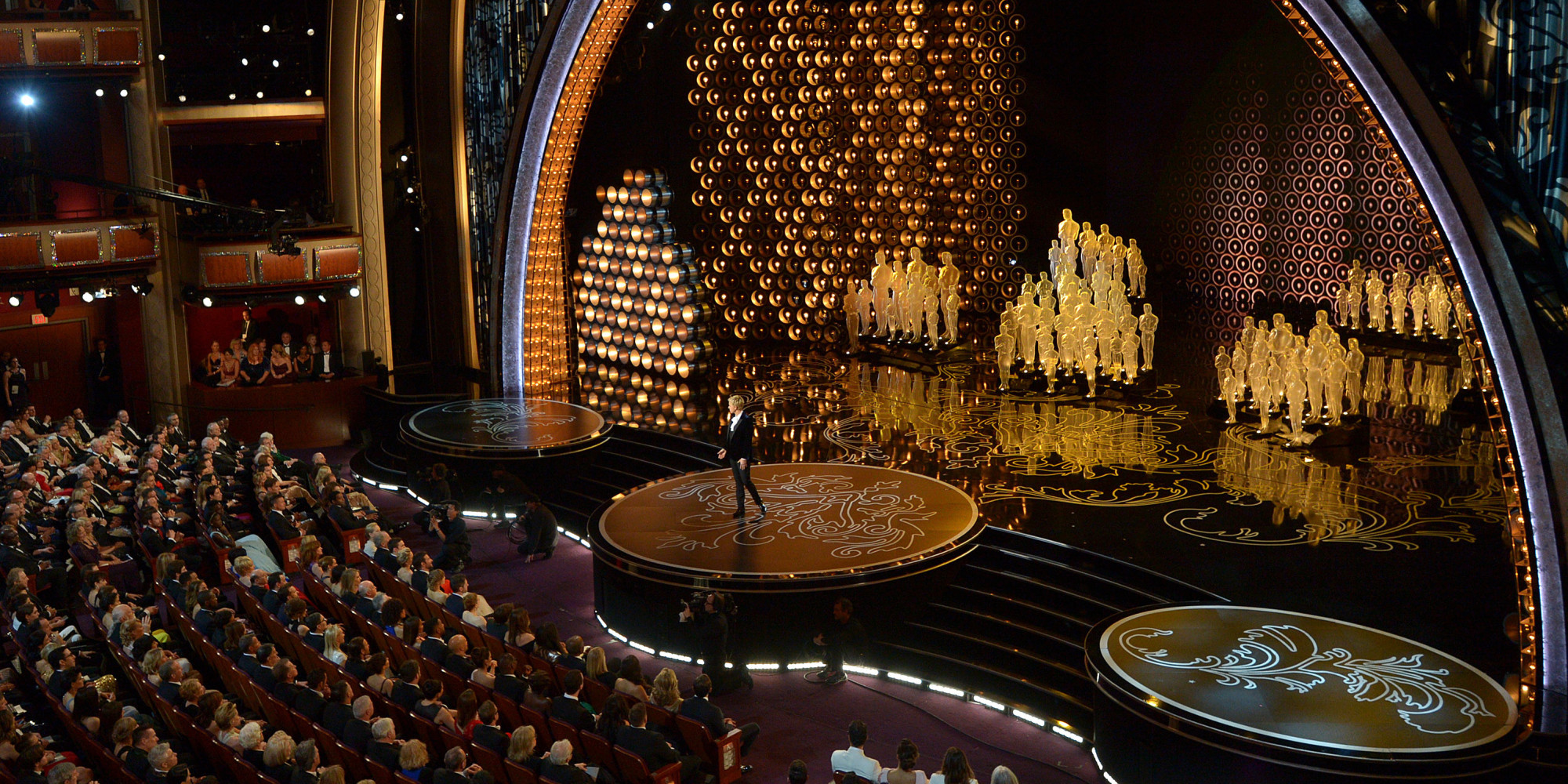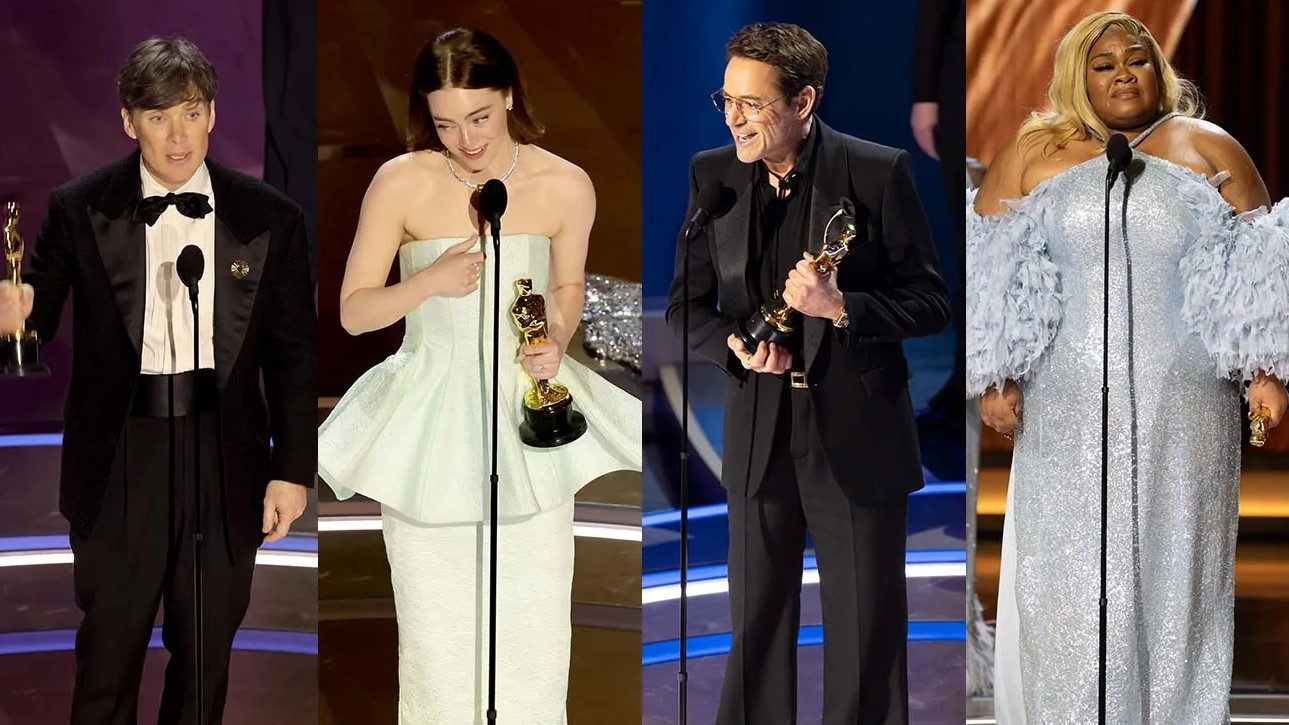The strangest thing about the 96th Academy Awards this year — even stranger than the off-camera acceptance speeches for ‘unimportant’ film categories — was how the world’s premier film award show had a fatalistic acceptance for its own flaws. The evening’s host, Jimmy Kimmel, summed it up in repeated jibes about Barbie director Greta Gerwig not being nominated, and women directors being overlooked in Hollywood in general, by pointing out that the audience laughing at his jokes were precisely the people who voted against her.
This award ceremony was supposed to be a throwback to the Oscars glory days — considering Robert De Niro and Al Pacino were both presenting over 50 years after they picked up awards for The Godfather films — but it was less of a throwback, more a cry for help, to keep a flagging momentum for the Hollywood glitz going.
Gerwig was snubbed for Best Director category, Kimmel was unimpressed by the omission, there were pro-Palestinian protesters outside the venue, and in the background of the latest Hollywood shutdowns last year — production crew went on strike after the pandemic — maybe it’s time for the industry to reflect on what it actually wants to be, instead of what it doesn’t want to be. Two of this year’s winners simply spoke about how $200 million budget movies could just as easily have been $20 million movies with the right production choices, and the importance of shooting on set instead of leaving everything to computer generated effects. By the end of the evening, the film hailed as movie of the year by the general public, Barbie only picked up an Oscar for best song.

Nowhere was this more readily apparent than in Jonathan Glazer’s Best International Feature winning film, The Zone of Interest. Or even the aftermath of the film. It’s a movie set in Auschwitz, about a German commandant settling in with his family trying to build a life from the horrors of war. In his acceptance speech for the award, Glazer, who belongs to a British Jewish family, was very vocal about repeating the mistakes of the past, about how survivors of the holocaust are still perpetuating violence in Palestine. The director went so far as to say that he and film producer James Wilson “stand here as men who refute their Jewishness and the Holocaust being hijacked by an occupation which has led to conflict for so many innocent people, whether the victims of October 7 in Israel or the ongoing attack in Gaza.”
The Holocaust Survivors’ Foundation in America did not take well to these statements and accused Glazer of profiting off of the genocide and their Jewish identity without ever having come to terms with either.
The larger problem with this is, how does one chart out the Academy’s political leanings? War and Hollywood are no strangers, Francis Ford Coppola made The Godfather yes, and he also made Apocalypse Now a handful of years after America had to withdraw from Vietnam. The latter film pulled no punches when it came to America’s imperial war machine but Hollywood seems to now.
Aside from the protests on behalf of Palestine outside the Academy Awards venue, there were people calling for truce in the Palestine-Israel conflict inside, with winners’ acceptance speeches talking about the Middle East. The Academy itself gave an award to an animated short film titled War Is Over! based on the activism of John Lennon and Yoko Ono. Yet the academy did not put out a single sentence about war. Film is never divorced from reality, but Hollywood is.

Oppenheimer swept the Oscars with seven wins including Best Picture, Best Director for Christopher Nolan and Best Actor for Cillian Murphy as the titular character. It is strange that Nolan with his enormous body of work finally got the Best Director accolade — films I have at various times both liked and disliked immensely — for essentially going over the beginnings of a war crime. Nobody’s going to look back at Nolan’s work and say that Oppenheimer was when he convinced them.
This year’s only alternative, however, was also by a legacy director, Martin Scorsese. Lily Gladstone was all set for a historic win for Native American representation in Killers of the Flower Moon. She lost to Emma Stone who starred in Poor Things. Da’Vine Joy Randolph was the only person of colour to walk away with a big award, for her supporting role in The Holdovers.
On the subject of repetition, Poor Things was an adaptation from Greek director Yorgos Lanthimos, who also directed Stone’s last Oscar-nominated performance in The Favourite, and she will be doing her upcoming film Kinds of Kindness with the same director. Some of the most repetitive and forgettable things seen in the last 10 years were made for the Academy Awards season, other than when Will Smith decided to take 2022 by storm by walking up to the stage and slapping Christ Rock.
There seems to be a huge disconnect in the industry itself. Cinema has not handled the introduction of streaming services well. Film is a very short medium yet we continue to hear things like I prefer long episodes to be episodic, 30-50 minutes at most. Even if you watch two episodes it shouldn't take you longer than 90 minutes. Films usually last much more than that.
Tell me if this sounds familiar. You started watching The Irishman a few years ago. You realised it's the same faces and names that you’ve seen in English language cinema all your life: Scorsese, De Niro, Pacino, Joe Pesci... Then realized how bloated and boring the film itself was, turned it off around 30 minutes and never went back to it again?

Hollywood has stuck with a ludicrous amount of fidelity to its success in the distant past which may shed light to the main round of criticism on why the Oscars have wound up to be so clueless and out of touch. First of all, it’s voted for by Academy members. In Pakistan we’re sick of hearing about meritocracy in the country, but how do you give yourselves a selection of awards every year and talk about merit in the same sentences.
The best international feature this year went to a film, for all its merits, which shouldn't even have qualified for it. Zone of Interest barely qualifies as a ‘foreign’ film. Mostly the criteria is about it being in a non-English language for the majority of its runtime. Zone was made by a British director, based on a book by a British author, the production company, A24, is American. Where is the international part? Parasite in 2020 was a much more ‘international’ film, yet it won the best picture as well. The film was entirely in Korean and it won Best Director, Best Picture, Best Original Screenplay. This is not to take anything away from Korean cinema or Jonathan Glazer, but the categories aren’t consistent, and haven’t been for a long while now, just adding more fuel to the Made for Oscars film track.
Case in point: Best Screenplay and Best Script have been awarded to Parasite and The Joker. One was in Korean, one in English. Who’s even qualified to attest Korean language screenplays or find out how original they are? Why even have international film then, if it’s outlived its usefulness?
Such selections make one question the usefulness of the awards themselves. Seeing the winning cast of the night made one recall a major franchise. Cillian Murphy, Gary Oldman, Christopher Nolan. But no, this wasn’t The Batman trilogy of films from 2006 - 20011. The same cast returned behind, and in front of, the camera for Oppenheimer. There’s something depressing about Western cinema if it’s gotten to this point. We’re more attuned to accepting these things in South Asian cinema; the person with the highest personal contacts gets the most billing, etc. It’s one thing being from the Kapoor family or being Dharmendra’s son and making a very ill-advised movie called Animal. It’s another thing making the fourth movie with a carbon copy cast in America because what reason do they have to keep hiring the same people again and again?
What we have now isn't merit. We make a lot of noise in the English language media about Pakistan's entrants into the Oscars every year. But beyond the fact that it would have helped films and filmmakers behind Joyland, would it even put the far-right criticisms to bed? The film, to date, has not been allowed to have a screening in the very city it was set in.
It's an enormously convoluted set of reasons why, but most of it can be reduced to transphobia. Would an Oscars not really have helped there? I think it would have fueled more right-wing conspiracies if anything. Barbie got banned last year and there was absolutely nothing in the story. Some people thought that some other people were pushing an LGBTQ agenda through the film. They weren't. But that's the sort of traction we're looking at here.
So do the Oscars really help change the cinema landscape of any country? It helps change your private portfolios. Korean or Japanese cinema does not need endorsement from Hollywood. It usually does more damage than good. Scorsese bothered one of Hong Kong cinema's finest movies, unrecognisably mutilating Infernal Affairs into The Departed, changing the characters from the Hong Kong underworld to yet another Scorsese iteration of American-Italian immigrant mafias. Infernal Affairs wasn't nominated for an award.
The most exciting cinema has not been made in Hollywood for some 20 years now, but we have a problem recognising it. An award here, a nomination there isn't going to fix that. I have checked out with the Oscars to an extent where, even a British actor and rapper of Pakistani descent, Riz Ahmed, fails to bring any enthusiasm for his Oscar-winning film Sound of Thunder. Year after year, the Oscar season search results on my streaming services feeds were one gargantuan disappointment after another.
I had watched The Reluctant Fundamentalist, in which Ahmed plays the protagonist and had tried convincing myself as best as I could, that this is a good film, independent of all the Oscar noise. It didn’t work.
